
Until recently, rumination was regarded as an involuntary symptom of depression and anxiety. Psychologists didn’t think that rumination could be voluntarily stopped because the mind simply ruminated on auto-pilot. According to Metacognitive therapy (MCT), however, rumination is an active thinking strategy that you can learn to control.
Rumination is repetitive thinking about events in the mind that are related to the present and the past. Ruminations often start with a “Why” sentence and can be a voluntary thinking strategy to find solutions to problems.
Excessive rumination, however, can worsen one’s mood and ultimately cause depression (3) (5).
Depressive rumination refers to a pattern of repetitive thinking in response to sad mood in which an individual analyses the causes, meanings and implications of their mood, problems and events from the past.
McEvoy et. al (2010)

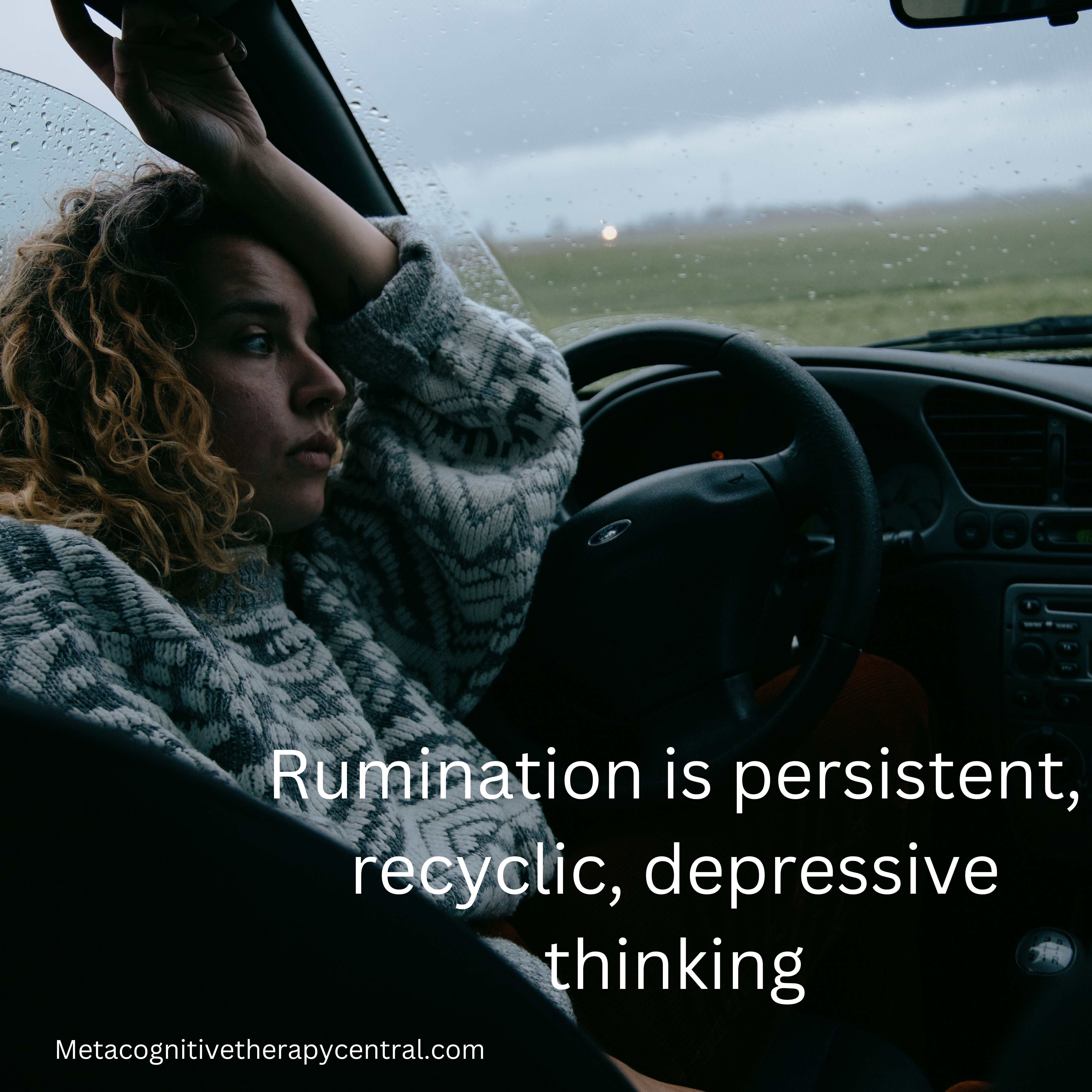
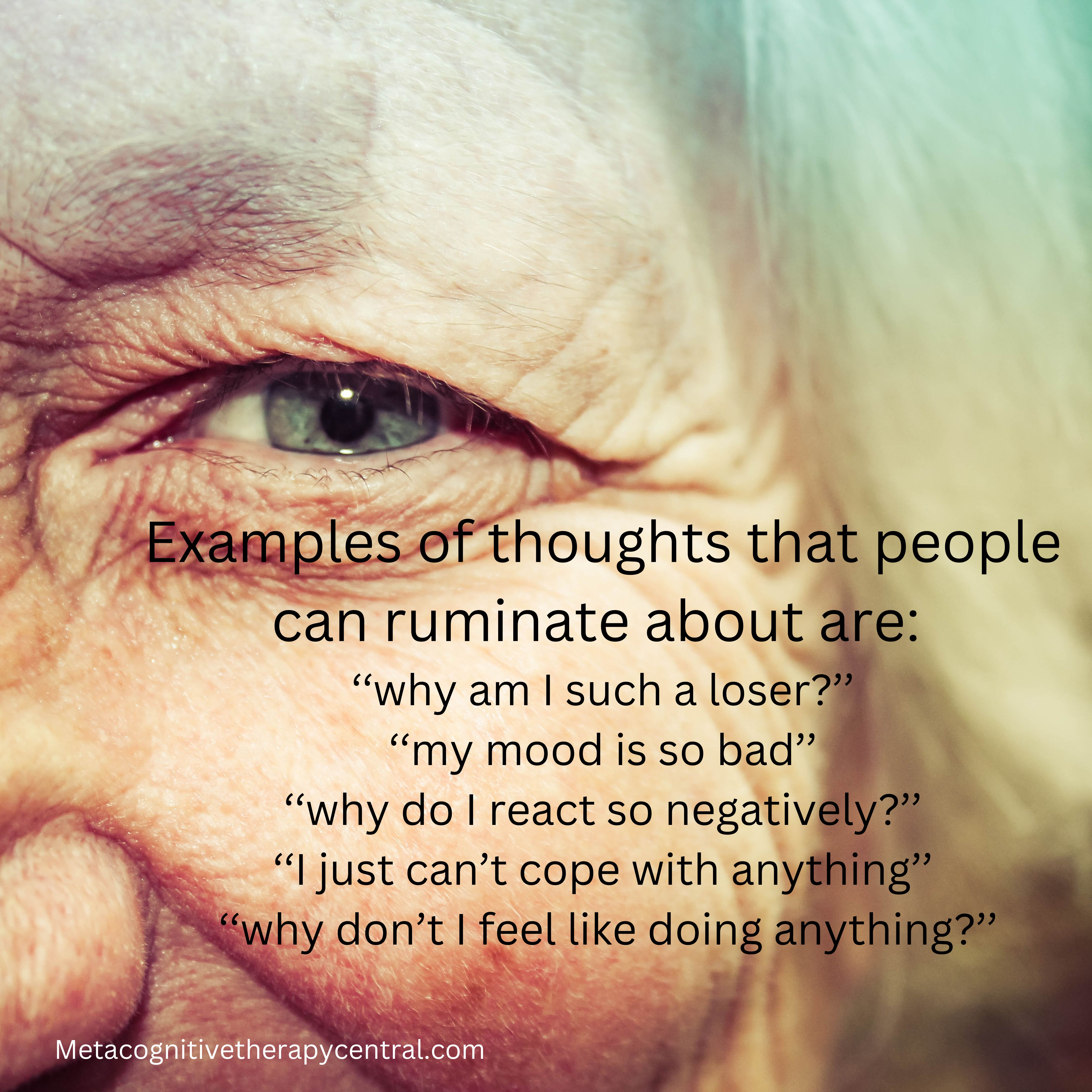
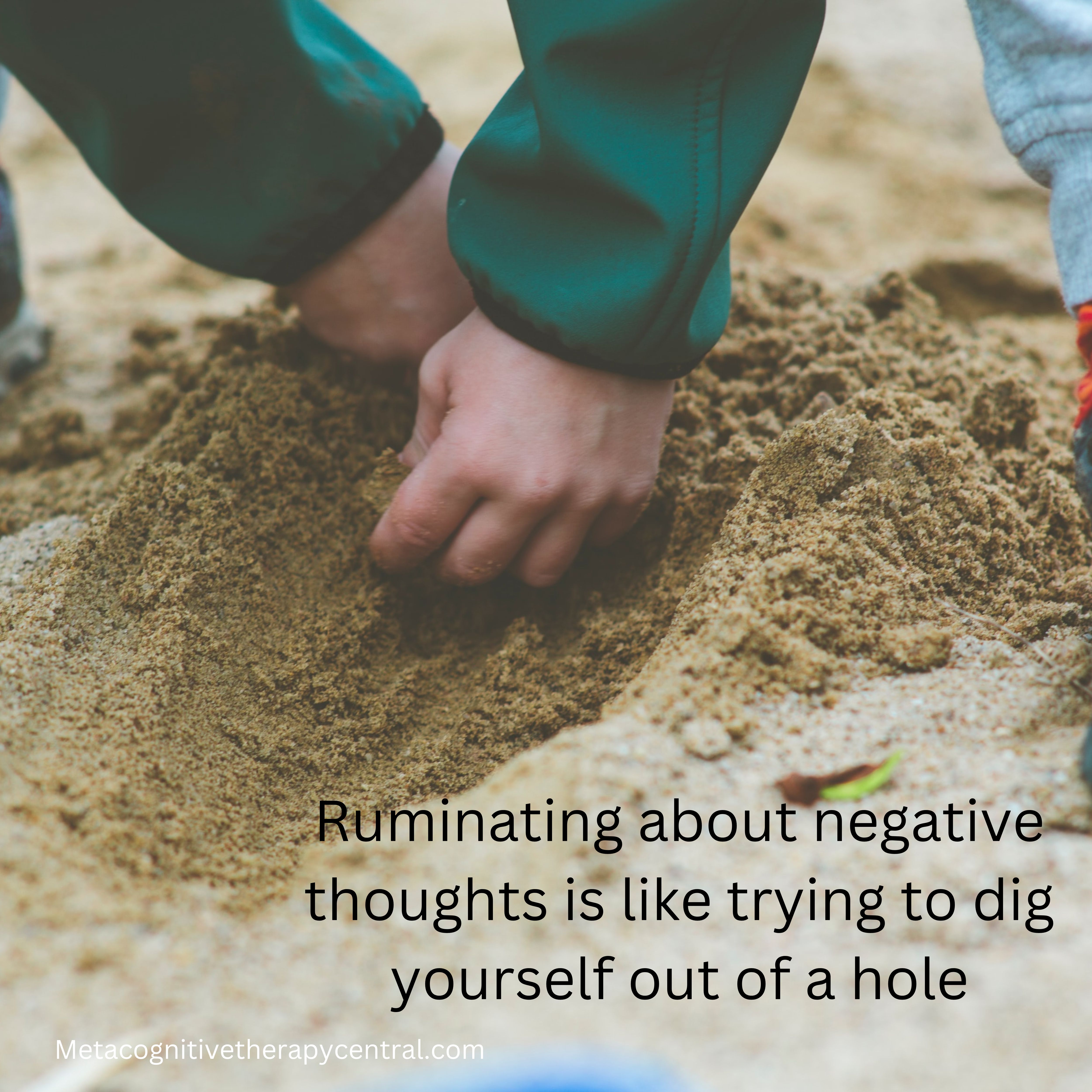
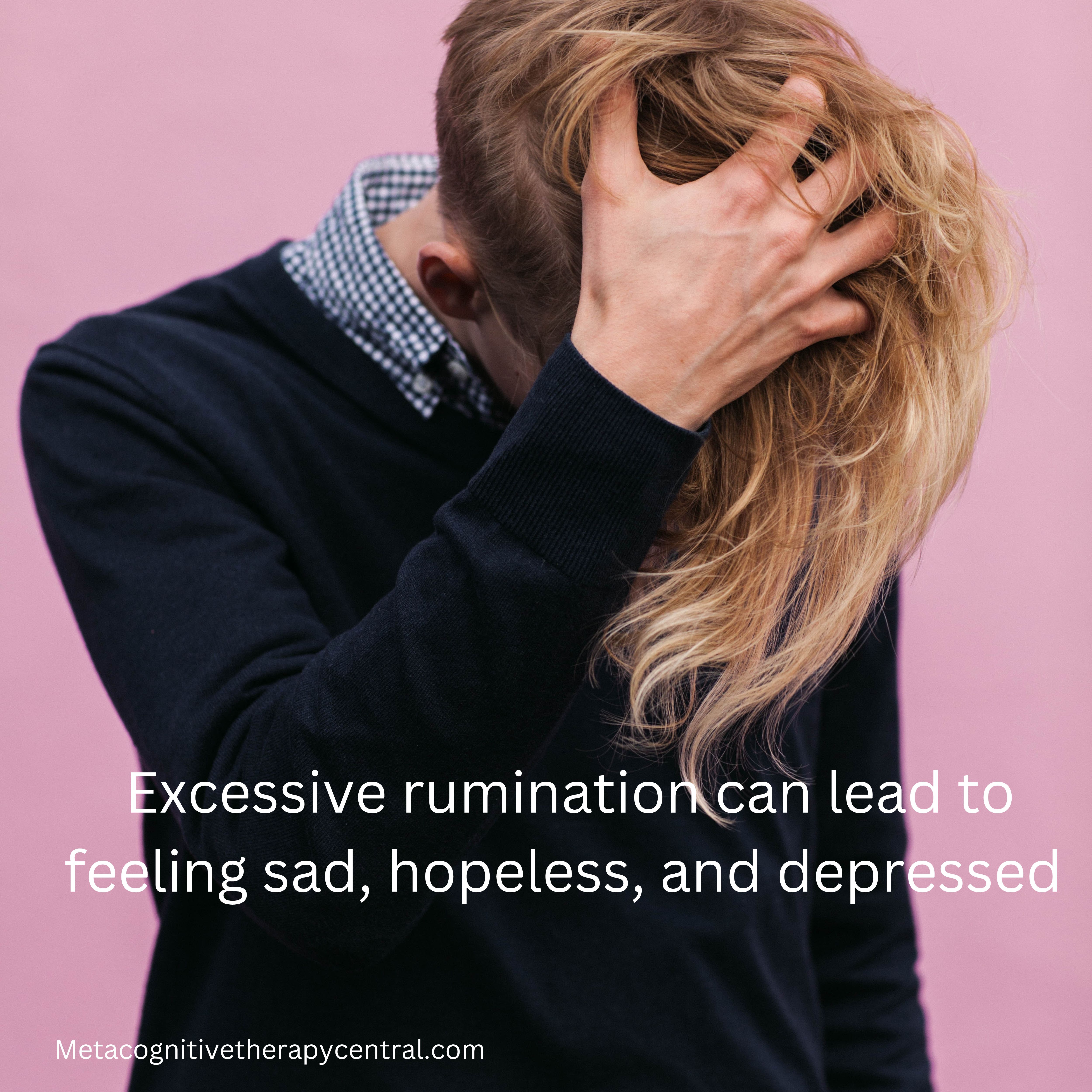
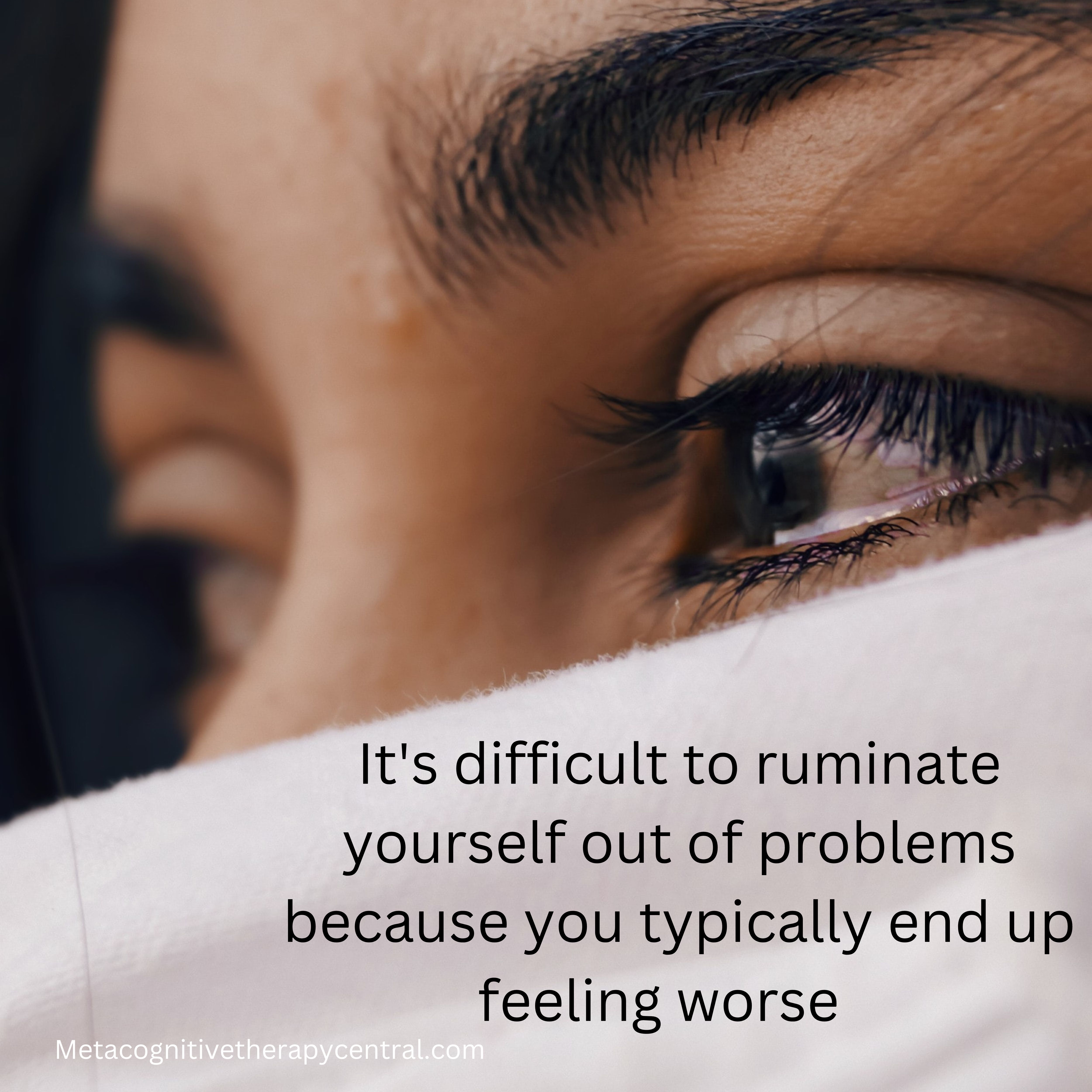
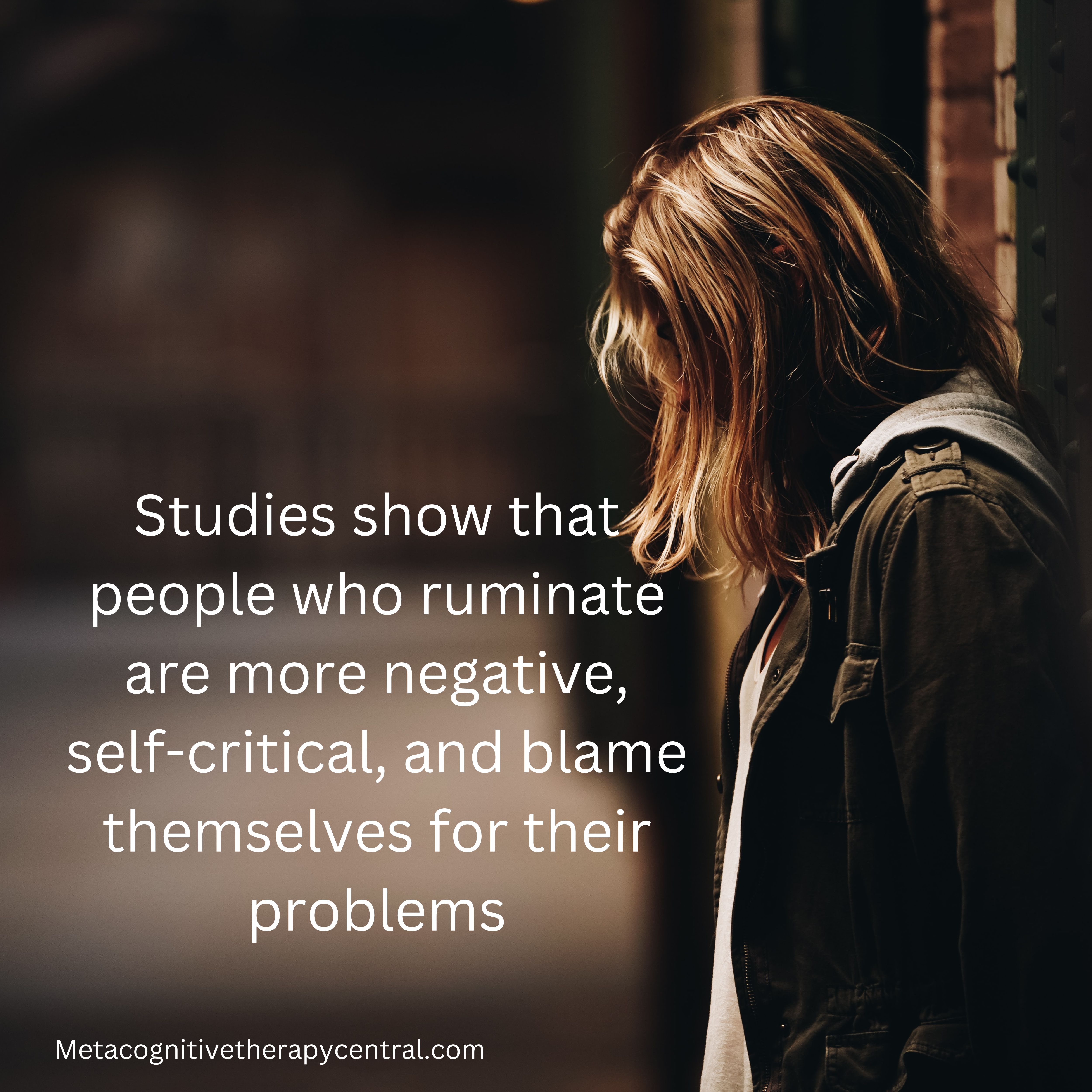
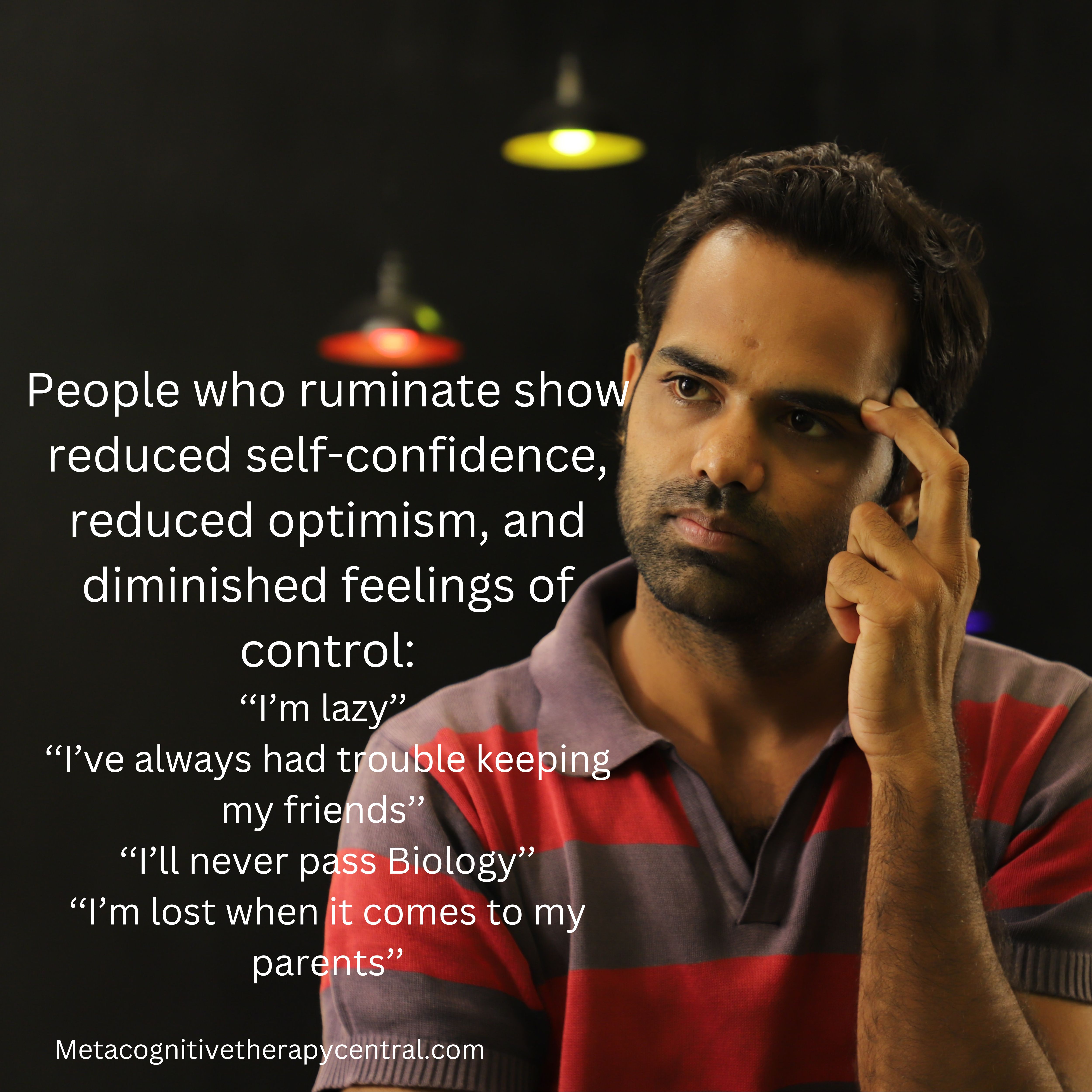
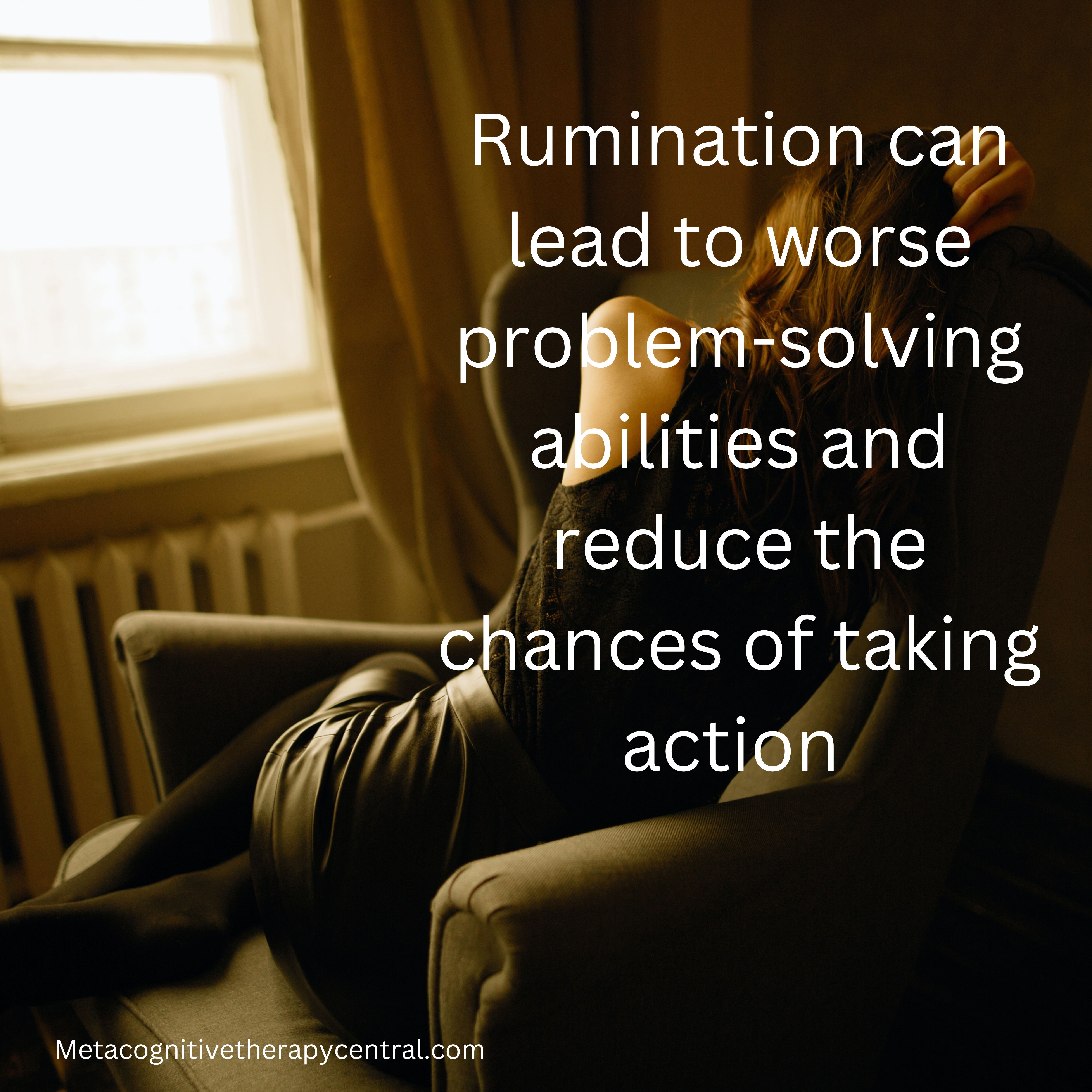

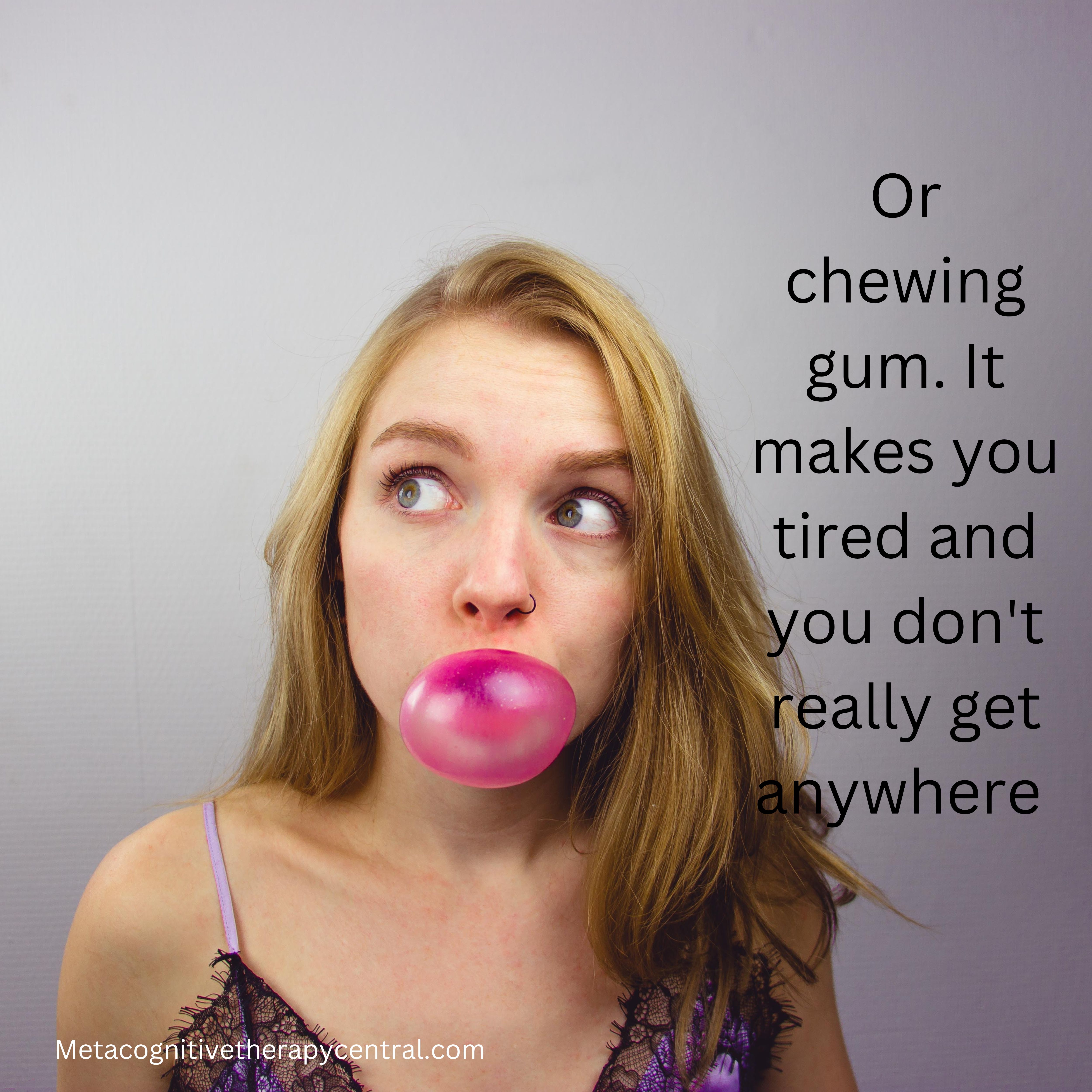




Why do people ruminate?
According to Metacognitive therapy, rumination is activated by a metacognitive belief that it is helpful and unstoppable at the same time. Therefore, to stop rumination, the metacognitive beliefs activating rumination need to be changed.
When people try MCT to learn to reduce their rumination, they can sometimes have difficulty doing so. This is because they, on one hand, believe that rumination will help them find solutions to all their problems. At the same time, they don’t feel that they can stop ruminating (3). It is normal to have both types of beliefs. These beliefs are also called metacognitive beliefs, which you can read about in this post.
According to a study (4) about rumination (repetitive negative thinking), the more the participants in the study believed that repetitive thinking was helpful, as well as uncontrollable, the more they did it.
We often hear the following statements from clients:
“Rumination helps me cope.“
If I ruminate, I can better solve/avoid problems
and
My rumination is uncontrollable
Usually, people start to ruminate because they think that they can get to the bottom of a problem or understand something better.
I don’t feel excited about work anymore. If I think about it, maybe I can figure out why.
Often, they will find a solution, stop ruminating and move on with their life.
But sometimes, there are no direct solutions to some problems, which can keep people in the ruminating loop.
Maybe it doesn’t have anything to do with work. Maybe I am not happy in my relationship after all. We have drifted apart. Or maybe I don’t have anything outside of work that I am interested in. Why am I like that anyway? Maybe there is something wrong with me. It’s like I can’t enjoy anything….
At this point, the mood worsens, and depressive symptoms can show up: tiredness, trouble concentrating, sadness, emptiness, hopelessness, and so on. Once these symptoms show up, some people experience that they can no longer stop ruminating.
My thoughts are all over the place. I can’t stop thinking. I feel like I am going crazy.
I can’t stop ruminating
Hence creating a negative cycle that can lead to a worsening of symptoms and, for some, end in depression.
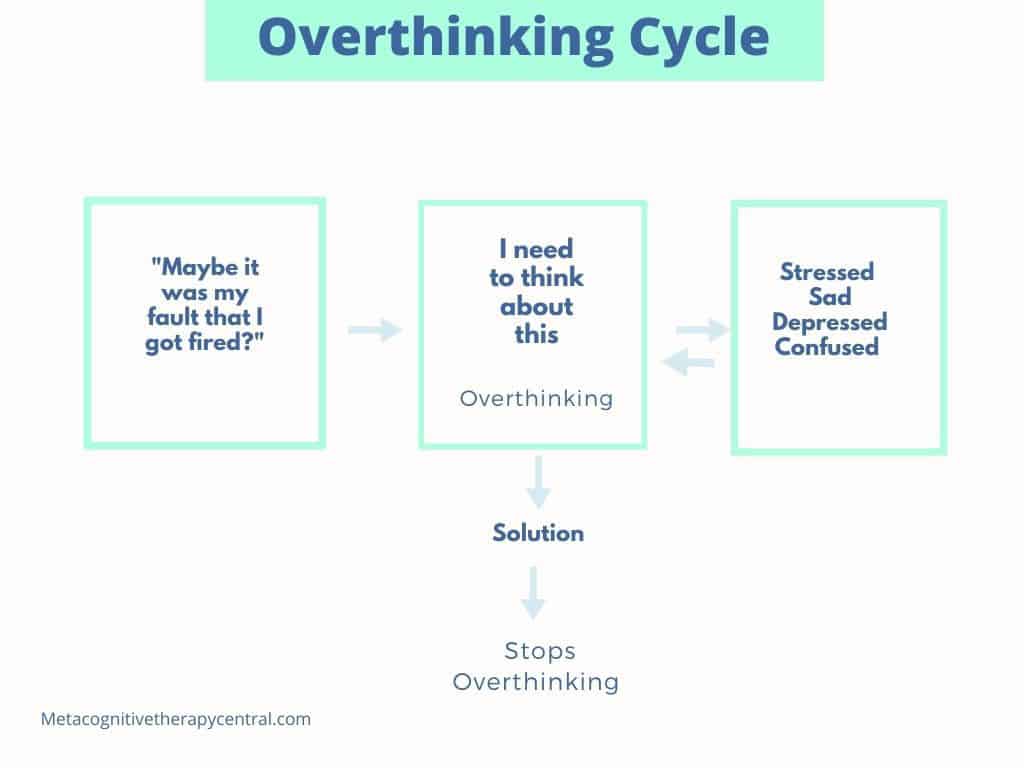
What are the consequences of rumination?
Despite believing that rumination is helpful, rumination can create emotional symptoms like low mood, stress, anxiety, depression, demotivation, and fatigue.
These symptoms go away if you feel that you’ve solved your problems by thinking about the right answer. But, what usually happens before getting to the right answer, is that you feel overwhelmed by negative emotions caused by the rumination.

Let’s say someone is fired from their job, and they start thinking about whether it was their fault or if they did something wrong. At this point, they are convinced that thinking about their situation will help them find answers.
After a few days of overthinking, feeling low and depressed sets in. And since no one likes to feel this way, they want to make that feeling go away by thinking even more about it: “Why am I feeling so low? Is there something wrong with me?” only to feel even worse. This negative effect is created and later maintained by persistent rumination.
If unchanged, this cycle can, according to MCT, lead to depression (3).
“If I think long enough about my problems, I will come up with a good solution and feel better.” Most people believe that ruminating is helpful, which is why they start in the first place.
Research on the effects of rumination
Research shows that people who ruminate are less likely to solve their problems in stressful times. They also express reduced satisfaction and commitment to their solutions and plans.
Rumination has proven to impair people’s problem-solving skills. In an experiment, students were asked to engage in rumination. Then, they were asked to imagine themselves experiencing different problems: for example, ‘‘a friend seems to be avoiding you“. The students were then asked to write detailed solutions to solving these problems.
The results from the experiment showed that the students who ruminated about negative thoughts came up with less effective solutions to these problems (5).
People who ruminate also have difficulty carrying out their plans and solutions to their problems. In a laboratory study, students who ruminated about themselves came up with some solutions to their current pressing problems (for example, “study harder” or “spend less money”). Still, they showed a reduced likelihood of carrying out these solutions (5) (6).

Excessive rumination can lead to poor problem-solving, low self-confidence, a negative outlook on life, and depression. According to MCT, depression is maintained by persistent rumination.
Can rumination be stopped?
“I can’t stop ruminating. It just happens beyond my control.”
You might feel that you don’t have control over ruminating and that it just happens in the back of your mind without your influence. But it is possible to stop ruminating because rumination is an active and conscious strategy, similar to having a conversation. Rumination is like having a conversation inside your head that you can choose to stop.
But it is important to note that not being able to control ruminations is different from not being able to control thoughts.
Thoughts can’t be controlled, but it is possible to stop dwelling on them (ruminating about them).
How can I learn to stop rumination?
If you suffer from depression and excessive overthinking, it is important that you seek professional help to learn to reduce it. Often, people mistake suppressing thoughts with reducing rumination and worry, which can backfire and cause more problems. Someone who is certified and experienced in Metacognitive therapy can better help you learn to reduce ruminations effectively.
Meanwhile, here are some steps that most people with overthinking tendencies can benefit from:
1) Become aware that you are ruminating. You can start asking yourself from time to time, “What am I doing right now in my head?”
2) Tell yourself, “I can stop ruminating” or, “I am in control,” and simply stop ruminating.
3) Know that overthinking does not help to solve problems. Time-limited problem-solving is better. Set aside 30 minutes every day to solve problems instead.
Rumination is an active and conscious strategy that you can learn to control. Rumination can be postponed for later or stopped by simply saying, “Stop ruminating.” However, to limit ruminations, it is essential that you fully believe that this is possible.
References
- Photo by Siora Photography
- Photo by Julia Taubitz
- Wells, A. (2009). Metacognitive therapy for anxiety and depression. Guilford Press.
- McEvoy, P. M., Mahoney, A. E. J., & Moulds, M. L. (2010). Are worry, rumination, and post-event processing one and the same? Journal of Anxiety Disorders, 24(5), 509–519. https://doi.org/10.1016/J.JANXDIS.2010.03.008
- Nolen-Hoeksema, S. (2004). The response styles theory. In C. Papageorgiou & A. Wells (Eds.), Depressive rumination: Nature, theory, and treatment (pp. 107–124). New York: Wiley.
- Susan Nolen-hoeksema & Jannay Morrow (1993) Effects of rumination and distraction on naturally occurring depressed mood, Cognition and Emotion, 7:6, 561-570, DOI: 10.1080/02699939308409206
- Photo by Christina-wocintechchat




